17 May 2021
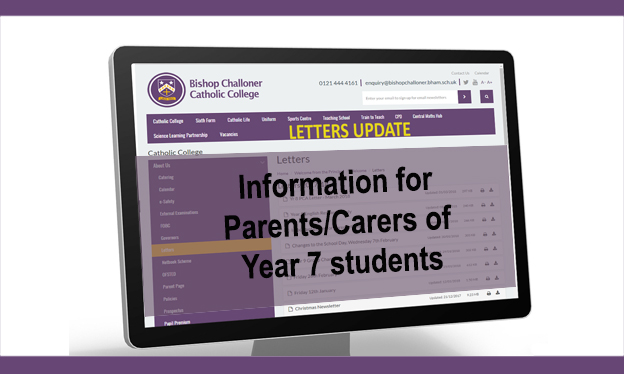

Year 7 P2 Assessments
Dear Parent/Carer,
During this half term your son/daughter will be sitting their periodic 2 (P2) assessments. These assessments allow us to measure the progress your son/daughter has made since the P1 assessments in December.
The assessment window is Monday 24th May-Friday 28th May and Monday 7th June-Friday 11th June.
In upcoming weeks students will be preparing for these assessments in class and will be provided revision guidance. Could I please ask that you encourage your son/daughter to revise at home on a regular basis over the next few weeks; this will allow them to demonstrate what they know in the assessments and help them build future foundations for revision patterns as they move onto Year 8. This will stand them in good stead for future assessments and public examinations
Heads of Department have provided some areas of guidance and direct links for revision which I have included on the reverse of this letter. Using these resources as part of their revision will help them feel well prepared for the forthcoming assessments. Please be aware that P2 assessment results make up part of the assessment process. Continual moderation of class work is monitored though book scrutiny from Heads of Department and analysis of working data from Key Stage 3 subject specific moderators. For your information, the next opportunity for group and band changes would be in Summer term 2. Supporting your child through the revision process is vital and if you have any specific questions please do not hesitate to contact the subject specialist teachers directly.
In addition to the subject specific revision tasks, please take note of the following advice from about ‘good habits’ for your child to develop.
Many students are slow at reading and have difficulty understanding text because they have not become fluent readers through regular practice. Reading for pleasure develops reading fluency and comprehension, improves vocabulary and increases general knowledge. It also develops the skills needed for writing and problem solving skills. Just 20 minutes reading a day could have a significant impact on your child’s achievement.
Many students are slow at writing because they print, others have very untidy handwriting. Touch – typing is one of the most valuable skills you can learn. The benefits include speed and accuracy as well as time saved when writing and reduces tiredness. It helps you to focus on the content of what you are writing. It also gives you the option of correcting errors as they appear. Students are encouraged to visit www.typingclub.com. Students should log in with their school email address. The password is 12345. The skill can be mastered quite quickly and once learned, is never forgotten.
Students encounter large quantities of new vocabulary in their courses, particularly when listening to teachers. The ability to spell the words correctly in note-taking, for looking up in dictionaries and books and for searching on the internet, will significantly affect their academic achievement. Encourage your child to practice spelling common words and key subject words correctly.
If you have any questions about the P2 assessments please do not hesitate to contact me at school.
Yours sincerely,
Mrs H J McGowan
Head of Year 7
Subject specific information and guidance on preparing your child for P2 assessments
English
Year 7 will be completing two English assessments in May. There will be one reading test and one writing test. The writing test will require students to write a short descriptive passage based on a picture and the reading assessment will require them to read a short fiction extract and answer a number of comprehension and inference questions about it.
All pupils will have received revision materials in the same format as the assessments.
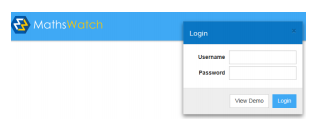
Maths
You will be undertaking your P2 in the week beginning 7 TH June Your assessment will consist of Three papers, each 1 hour long. We recommend that you use MathsWatch to help with your revision. Below are the clips that are relevant to the P2 topics that are to be tested.
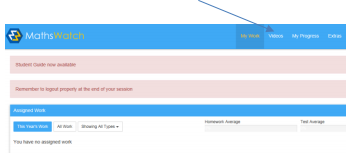
Reminder: MathsWatch is at www.vle.mathswatch.co.uk. Your username is the same as the beginning of your email @bishopchalloner. Your password is bishop
When you log in, click on Videos
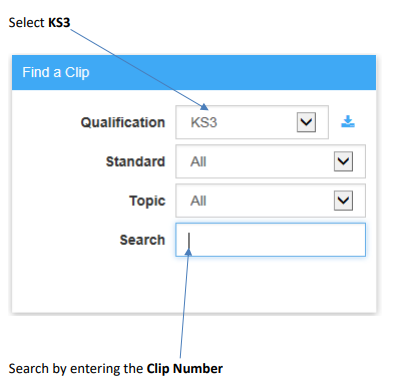
Your time on MathsWatch topics is recorded on the website; your teacher will be able to see how much revision you have done on Mathswatch! If you want to revise other topics, you can search for them by topic. The table below consists of all topic you need to revise to be successful in your P2 assessment. Along with each topic title is the MathsWatch clip reference number and a checklist you can fill out before beginning revision.
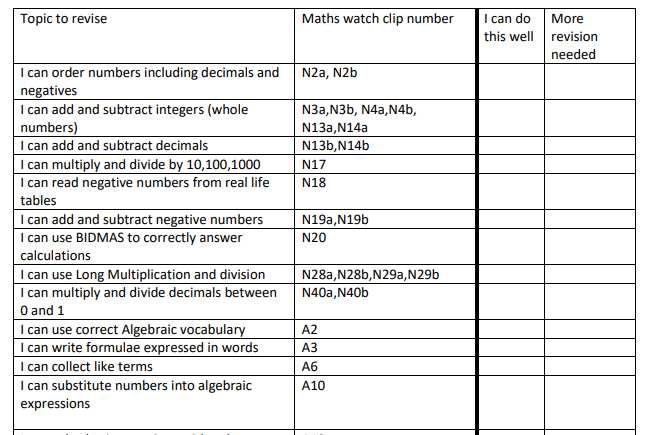
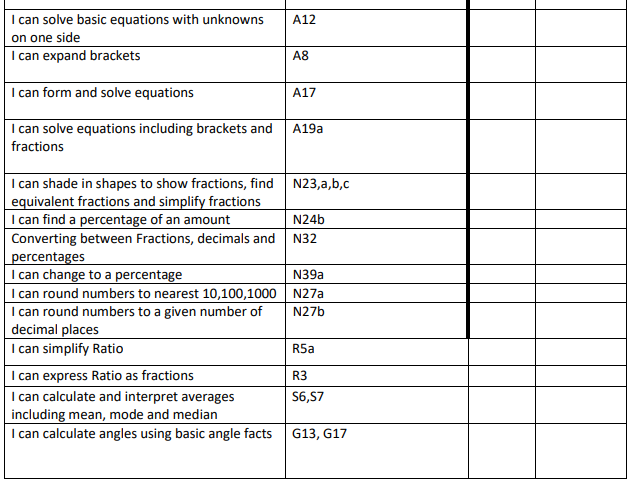
Science
Students will be given a minimum of two weeks’ notice prior to their assessment in W/C Monday 17th May. The assessments will take place in W/C Monday 7th June. Revision guidance will also be put on Teams/classcharts.
P2 Content for revision
1 x 1hr exam on Autumn and Spring topics.
- Cell structures, functions and unicellular organisms
- Tissues and organs
- Microscopy
- Puberty, menstrual cycle, fertilisation and pregnancy
- Laboratory equipment and hazard symbols
- Changing state
- Separating techniques
- Acids, Alkalis and neutralisation
- Types of energy and energy transfers
- Energy in food and types of fuels
- Electrical circuits – equipment, series, parallel, potential difference and fuses
Religious Education
The Y7 RS assessment is focusing on our unit called ' Catholic Identity'.
Skills to practice:
- Define a word in two sentences
- Write in full paragraphs (P.E.E.L) using evidence to support points.
- Memorising sources of wisdom and authority
Topics:
Rosary
Our Mother Mary
Incarnation
Holy Trinity
Pentecost
Sacraments
Baptism
Eucharist
French
Students will be assessed in four main skills: listening, reading, writing and speaking. Students will be informed about precise assessment dates prior to the 24th May. The speaking assessment will take place independently, with students recording their responses to questions via One Note. Clear guidance and deadlines will be given to students prior to the completion of the Speaking Assessment. The reading, writing and listening assessment will be covered in lesson time.
The assessment will include all topics studied in lessons this year: likes and dislikes, justification, description of themselves, school subjects, time, description of the school routine, how they use their computers.
Students will need to revise all their vocabulary using www.quizlet.com. There will also be revision materials, activities and lists of vocabulary on: http://frenchbc.weebly.com/p2-blog
Geography
Geography students will sit an assessment based on their Geographical knowledge, understanding and skills. Students will be issued with comprehensive revision checklists by their subject teachers. The main areas for revision will be the human and physical geographies of the country of China. Students will also be tested on some of the geographical skills they have been taught so far this year. These include map reading skills, photograph interpretation and the use of source material such as a graphs or data tables. Students will benefit from making summarised revision notes in the form of flash cards, mind maps or bullet pointed notes from the revision material they have been given.
History
In History students will be assessed later in the school year on their knowledge and understanding of the power of monarchs and how it has been changed over time. Student will consider how religion, parliament and the people have challenged the authority of monarchs by looking at the reigns of William, Henry II, John, Elizabeth and Charles I. The key skills that will be measured are: students’ ability to consider change and continuity across the reigns of monarchs from 1066-1649, their ability to use historian’s interpretations in their written work as well as their ability to demonstrate good knowledge of what has been studied over the academic year. Revision information and support will be distributed in History lessons at the appropriate time.
Physical Education
Pupils are continually assessed in Physical Education across the 3 strands; Head (Decision Making, Knowledge, Analysis, and Confidence), Heart (Physical, Technical, Competition and Fitness) and Hands (Social, Emotional, Effort and Attitude). Pupils will be taught, and content re-visited through lesson time. The Physical Education department encourages all pupils to attend extra-curricular clubs to enhance their practical skills further. Information about the timetable is online on the school website and on our Twitter page; @BCPEDepartment. Please refer to pupil planners for an outline of the Physical Education assessment descriptors and help pupils to familiarise themselves with key terminology, especially for the strand.
.jpg)